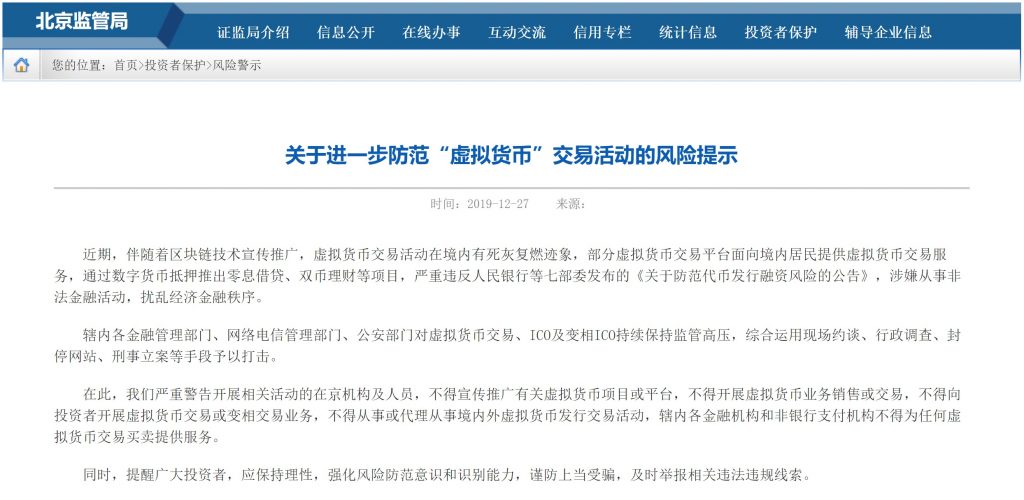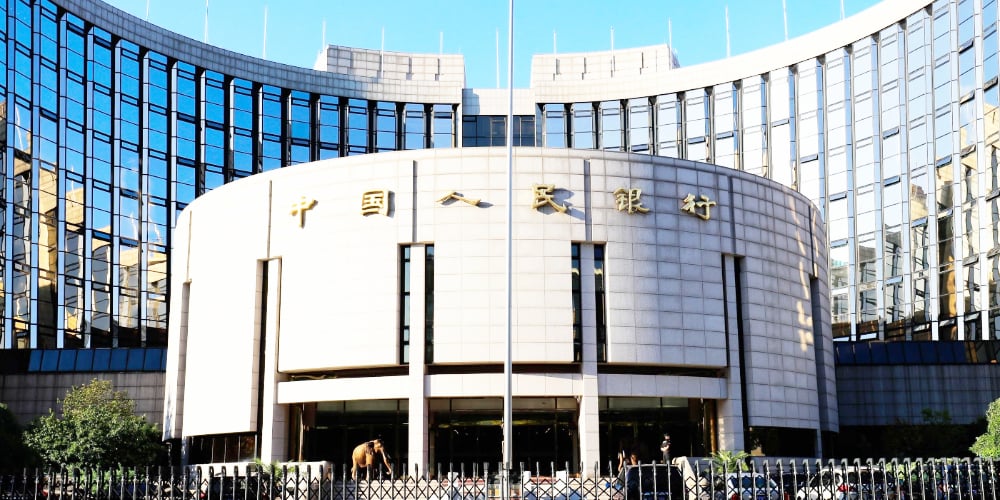
Four financial regulators in China have jointly issued a fresh warning regarding crypto trading activities in Beijing. The notice explains the reason for the warning and lists prohibited crypto activities, which have reportedly been surging as companies ramp up their blockchain promotion.
Also read: Regulatory Roundup – New US Crypto Bill, France’s 1st Approved ICO, Muslim Crypto
Joint Warning by 4 Chinese Regulators
On Friday, four Chinese regulators jointly issued a notice on the prevention of crypto trading activities in Beijing. The four regulators are Beijing Financial Supervision Administration, Business Management Department of the People’s Bank of China (PBOC), Beijing Banking and Insurance Regulatory Bureau, and Beijing Securities Regulatory Bureau.
The notice begins by explaining that recent promotion of blockchain technology has led to increased crypto activities in China, adding that some platforms are providing crypto trading services to domestic residents and offering crypto products such as zero-interest loans. The notice emphasizes that these activities are “serious violations” of the “Announcement on Preventing Financing Risks of Token Issuance,” which was published by seven regulators in September 2017.

Among the seven regulators were the PBOC, the Ministry of Industry and Information Technology, the China Banking Regulatory Commission, the China Securities Regulatory Commission, and the China Insurance Regulatory Commission. Their joint announcement on Sept. 4, 2017, led to the closing of cryptocurrency and initial coin offering (ICO) trading platforms in the country.
On Nov. 25, the PBOC published a financial stability report for 2019, stating that 173 domestic crypto trading and digital token platforms have “exited without risk.” Meanwhile, local regulators have also been implementing similar measures. The PBOC’s Shanghai Head Office recently issued a notice detailing its efforts in line with the September 2017 announcement. Other cities have also been increasing their efforts, including Shenzhen where local authorities have reportedly been questioning crypto businesses. There have also been reports of Guangzhou’s regulators taking a similar approach.

Prohibited Activities
The notice issued by the four regulators in Beijing on Friday explains that various regulators have continued to “maintain high pressure” on activities involving cryptocurrencies and ICO transactions. They employ methods such as “on-site interviews, administrative investigations, website closures, and criminal case filing to combat them,” the notice describes.
The regulators further warned that “institutions and personnel in Beijing that carry out related activities shall not publicize and promote relevant virtual currency projects or platforms.” Other prohibited activities are conducting crypto business transactions, engaging in crypto transactions with investors, and engaging in domestic and overseas token issuance or trading activities. Furthermore, the notice emphasizes that financial institutions and non-bank payment businesses cannot provide any crypto-related services.
Since President Xi Jinping advocated for blockchain technology and said that China should expedite the development of this technology as the core for innovation, many Chinese companies have been promoting the technology for use in their businesses. This week, the Shenzhen Stock Exchange launched a blockchain index comprising stocks of the largest 50 publicly listed companies with blockchain ventures.
What do you think of this warning by four Chinese regulators? Let us know in the comments section below.
Disclaimer: This article is for informational purposes only. It is not an offer or solicitation of an offer to buy or sell, or a recommendation, endorsement, or sponsorship of any products, services, or companies. Bitcoin.com does not provide investment, tax, legal, or accounting advice. Neither the company nor the author is responsible, directly or indirectly, for any damage or loss caused or alleged to be caused by or in connection with the use of or reliance on any content, goods or services mentioned in this article.
Images courtesy of Shutterstock and the Chinese government.
Did you know you can buy and sell BCH privately using our noncustodial, peer-to-peer Local Bitcoin Cash trading platform? The local.Bitcoin.com marketplace has thousands of participants from all around the world trading BCH right now. And if you need a bitcoin wallet to securely store your coins, you can download one from us here.
The post 4 Beijing Regulators Issue New Crypto Activity Warning appeared first on Bitcoin News.
from Bitcoin News https://ift.tt/361JDtL
Comments
Post a Comment